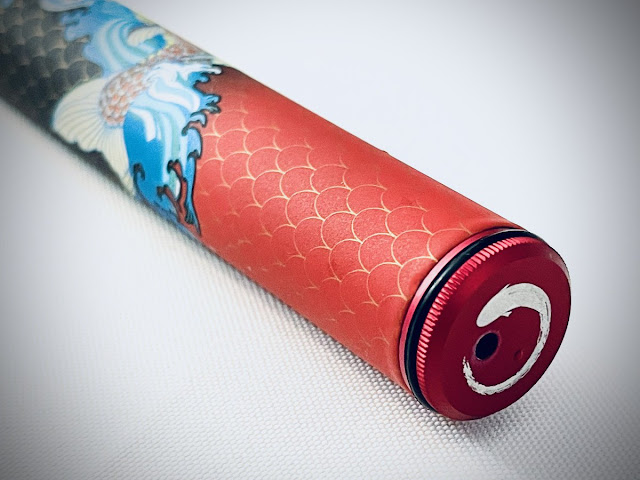NOTICE: Please see the end of this review for an update regarding the Shinobi.
If there is one thing that Tenkara Tanuki is known for, it is high quality. I have a couple of his rods, a Black Beauty 375 Original and an XL-1, and they are some of my favorite tenkara rods. Well, Tenkara Tanuki, a.k.a. Luong Tam, has caused quite a bit of stir in the social medial forums once again, regarding a new rod.
Labeled the Shinobi 395, this rod has been in design and testing for the past four years. With heavy input from Rob Worthing, the Shinobi 395 is designed for contact nymphing as well as tenkara techniques. Rob Worthing is a certified guide and founding member of Tenkara Guides LLC, creator of TROutreach, a proud member of Team Oni USA, and one the first Americans inducted into Japan’s Harima Tenkara Club. He is one of the most knowledgeable tenkara anglers outside of Japan, but he also has helped advance tactical nymphing techniques using fixed-line rods.
Luong says about this rod blank, "About the rod concept history, the rod action is based on Dr. Robert Worthing, the Ultralight Fishing Techniques. It means the rod is designed and built for casting a super finer level line with a small fly. In this case, for the level #2.5 and the most effective nymph size #18 bead head."
The Shinobi 395 comes in a cardboard container (which is designed to have a lower environmental impact than traditional plastic packaging). The rod comes with a red, padded neoprene rod sleeve. The overall coloration of the rod is dark charcoal with a glossy finish. Other than the handle and tip sections, all sections are unsanded blanks. All sections, minus the tip section, have a red band accent at their tipward portion.
There are currently two versions of the Shinobi 395, one with a carbon fiber handle and one with a wood accented EVA foam handle. The Shinobi that was sent to me has the carbon fiber handle. The handle is 30.5 cm (12 inches) long, 2.48 cm (1 inch) in diameter, is tapered towards the head, and slightly tapered towards the butt. The handle is ornamented with an oriental dragon motif/fish scale design that is covered with an anti-slip coating. This is both beautiful and very functional.
Regarding the carbon fiber handle, Luong says, "The carbon grip is designed for better ergonomics and increased the rod sensitivity. It is designed for a one position and loose grip casting. The pinky (little finger) rests about on the Carp image on the grip and the thumb rests about the dragon head because the diameter smaller at the carp where the little finger is shorter. In the theory, the smaller diameter would help to reduce the stress the little finger when it comes to casting or playing a bigger fish. The construction of the grip is similar to the keiryu rod, it is an extension of the rod blank. The advantage of the this type grip is the sensitivity, fisher would feel more direct contact or closer to the fish."
The tip plug is red anodized metal with a black nylon post. It fits snugly into the tip of the handle section. A small loop of lilian material is attached. The butt cap is red anodized metal, has knurling to aid in removal, and has a decompression hole. An O-ring helps keep the butt cap from spontaneously coming unscrewed.
The lilian is yellow-orange and is attached to the tip section with a very well executed glue joint. The tip section, on the rod I was loaned, cannot be withdrawn through the second section (in the Japanese convention, the tip section is #1), therefore this rod cannot be completely disassembled for drying and cleaning.
Here are my measurements:
Fully Nested: 66.5 cm (26.2 inches).
Fully Extended: 388 cm (12.7 feet).
Weight (without tip plug): 84.1 g (2.97 oz.).
CCS: 22 pennies.
RFI: 5.7
Rotational Moment: 6.7
Casting the rod is a delight. The rod has a responsive tip, but flexes mostly in its 2nd-4th sections. The action is crisp, but does not require a lot of force. The casting arc is smooth and beautiful. There is no oscillation at the casting arc terminus and tip recovery is quick. The rod casts beautifully in the traditional overhead arc, but it also is excellent when casting with more of a rotational movement (so called four dimensional casting).
I used #2.5 through 3.5 fluorocarbon level lines with the rod and line lengths varied from 330 cm to 400 cm (3-4 feet of tippet added to this). The Shinobi handled each line and length without any issues.
I fished the Shinobi with fly setups varying from an #20 RS2 emerger to a dropper/point fly double tungsten bead head rig. Again, the rod performed flawlessly. The rod is specifically designed to excel at tactical or contact nymphing, and it did not disappoint. Casting a two bead head set up can be challenging sometimes, but the Shinobi controlled the flies superbly and never felt overloaded.
I mostly caught trout ranging from 10 inches to 18 inches. All of these were easily controlled, even in faster current. I did happen to hook a 10-12 lb carp, and the rod really performed well. I was fishing with 5.5X tippet, so I didn't try to land the big boy, but I did take the opportunity to observe the rod's power curve under load. I was able to control the carp easily and never felt like I was out of control. At the last minute I intentionally grabbed the line and broke the tippet.
Hook sets are decisive and fast. Even when fishing tungsten bead heads in water deeper than eight feet, hook sets were quick and sure. Although the Shinobi has a rotational moment of 6.7, my arm didn't get tired of casting or holding the rod, even after hours of fishing.
Here is a video of me testing the rod:
Conclusion: I really like this rod. Aesthetically, this is a beautiful rod. And true of all of Luong Tam's creations, it is near perfect in fit and finish. It is close to perfection for a tactical nymphing rod, having a light overall weight, reasonable rotational moment (the measure of tip heaviness when fully extended), powerful lower sections, and fast hook set. I don't know what else to say, it's a great rod to fish. I've fished a lot of rods, and I can confidently say that what Tenkara Tanuki is putting out now are rods that are every bit as good as Japanese rods, and maybe even better for certain fishing circumstances. The Shinobi is world class.
Are there any things that I don't like? Well, yes, there are a few but they are very minor. I am a little disappointed that the rod comes in short of its advertised length of 395 cm. I'm also a little disappointed with the rotational moment of 6.7. It's really not that high of a rotational moment (RM), but anything over a value of 6 and a rod begins to feel tip heavy. An RM of 6.7 is better than 7, but 6.0 would be better. Finally, I would have hoped that the rod could have been completely disassembled for drying and cleaning. I don't think this is too much to ask on such a high quality rod.
So there you go, the new Shinobi 395 from Tenkara Tanuki. I don't know the price point, but whatever it will be I'm sure it's worth it!
Disclaimer: My opinion regarding this rod is just that, my
opinion. Your opinion may differ. Also, your rod may not have the
same length, issues, or functionality as my rod. There are variations
between rods, even in the same production run. No description can fully
tell you how a rod feels or fishes. For this, you must personally hold,
cast, and fish the rod then make up your own mind.
I received the rod from Tenkara Tanuki, and returned it upon completion
of the review.
Update 6 Jan 2023: After my initial review, Luong notified me that he had corrected the length of the rod, to better reflect the advertising length of 395 cm. When the Shinobi was released, it came in two different styles, carbon grip and traditional (foam handle). I purchased the Shinobi Traditional LE 395. I took some measurements of it and noticed that the blank was very different than the rod I reviewed, although I was told that the carbon handle and foam handle rods have the same blank, except for the handle section.
Extended: 397 cm
Weight: 84 g
CCS: 19 pennies
RFI: 4.78
RM: 6.9
Also, now the tip section can be removed through the second section. That's good news!



















Catching a carp in water like that stream was indeed interesting. I suppose carp eat flies the way trout do.
ReplyDeleteTom, did your opinion change at all with the new, Traditional LE version of the rod? I'm looking at adding it to my collection and noticed you said it has a different blank than the other Shinobi's. Looks like a slightly lower penny rating and higher RM? Thanks
ReplyDeleteIan, I liked both of the versions, the one in this review and the current version (Traditional LE). Tanuki rods are excellent rods.
Delete